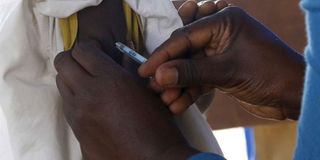Medics call for mass hepatitis B vaccination in prisons

Medics have called for mass vaccination of all inmates and wardens in the country’s prisons because of the high prevalence of hepatitis B. PHOTO | NATION MEDIA GROUP
What you need to know:
The medics attributed the high prevalence of the disease to a number of activities, including homosexuality, and sharing of toothbrushes, shaving machines and razor blades.
At Lodwar GK Prison, 42 out of 144 blood samples collected in April 2017 tested positive for hepatitis B.
There is no cure, but antiviral drugs have proven effective in coping with symptoms.
Medics have called for mass vaccination of all inmates and wardens in the country’s prisons because of the high prevalence of hepatitis B.
The medics attributed the high prevalence of the disease to a number of activities, including homosexuality, and sharing of toothbrushes, shaving machines and razor blades.
At Lodwar GK Prison, 42 out of 144 blood samples collected in April 2017 tested positive for hepatitis B. The facility had 700 inmates. Three samples tested positive for hepatitis C.
“In my view, this is enough to be labelled as an outbreak and I call for mass vaccination of all inmates and wardens,” said a doctor who sought anonymity since he is not authorised to release such data.
BLOOD DONATIONS
He said that blood donations in prisons should be stopped, or the blood screened thoroughly. “When schools are closed, we get our blood from prisons but I don’t think it is a viable idea. Only vaccination will help us arrest the situation. It is also very dangerous to the wardens,” he noted.
“The situation is serious at the prison. The place is small, with the men confined in one place. Terrible things must be happening, making the spread easy,” said the doctor.
Dr Hilda Nabiswa, a physician at the Lodwar Referral Hospital, said the prevalence was in the general population though it could be higher in prisons because of “hidden” activities.
“We are going to carry out a further study to verify the data, although I have been witnessing the same in the general population as well. There is a need to raise awareness of HBV to the same level as that of HIV,” she said. Screening and vaccination of prisoners is going on at the facility. In 2016, at least 36 inmates at the Kamiti Prison contracted hepatitis B. If left untreated, HBV can cause liver diseases and cancer.
HEPATITIS B
An estimated 600,000 people die every year from hepatitis-B related liver diseases, making HBV a bigger killer than malaria.
A test for HBV has been available since the early 1970s, but only one in ten sufferers worldwide have been diagnosed.
The virus is highly contagious via infected blood or other body fluids and is mainly transmitted from mothers to their infants, or between children.
There is no cure, but antiviral drugs have proven effective in coping with symptoms.
A vaccine against HBV became available in the early 1980s. Since 1992, the World Health Organisation has recommended the first dose within 24 hours of birth, but only half of the newborns are vaccinated that quickly.




